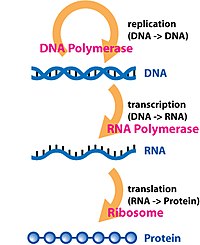
Photo from wikipedia
The eukaryotic translation initiation factor eIF4E acts in the nuclear export and translation of a subset of mRNAs. Both of these functions contribute to its oncogenic potential. While the biochemical… Click to show full abstract
The eukaryotic translation initiation factor eIF4E acts in the nuclear export and translation of a subset of mRNAs. Both of these functions contribute to its oncogenic potential. While the biochemical mechanisms that underlie translation are relatively well understood, the molecular basis for eIF4E's role in mRNA export remains largely unexplored. To date, over 3000 transcripts, many encoding oncoproteins, were identified as potential nuclear eIF4E export targets. These target RNAs typically contain a ∼50-nucleotide eIF4E sensitivity element (4ESE) in the 3' UTR and a 7-methylguanosine cap on the 5' end. While eIF4E associates with the cap, an unknown factor recognizes the 4ESE element. We previously identified cofactors that functionally interacted with eIF4E in mammalian cell nuclei including the leucine-rich pentatricopeptide repeat protein LRPPRC and the export receptor CRM1/XPO1. LRPPRC simultaneously interacts with both eIF4E bound to the 5' mRNA cap and the 4ESE element in the 3' UTR. In this way, LRPPRC serves as a specificity factor to recruit 4ESE-containing RNAs within the nucleus. Further, we show that CRM1 directly binds LRPPRC likely acting as the export receptor for the LRPPRC-eIF4E-4ESE RNA complex. We also found that Importin 8, the nuclear importer for cap-free eIF4E, imports RNA-free LRPPRC, potentially providing both coordinated nuclear recycling of the export machinery and an important surveillance mechanism to prevent futile export cycles. Our studies provide the first biochemical framework for the eIF4E-dependent mRNA export pathway.
Journal Title: RNA
Year Published: 2017
Link to full text (if available)
Share on Social Media: Sign Up to like & get
recommendations!